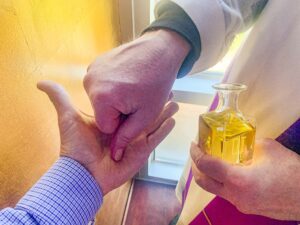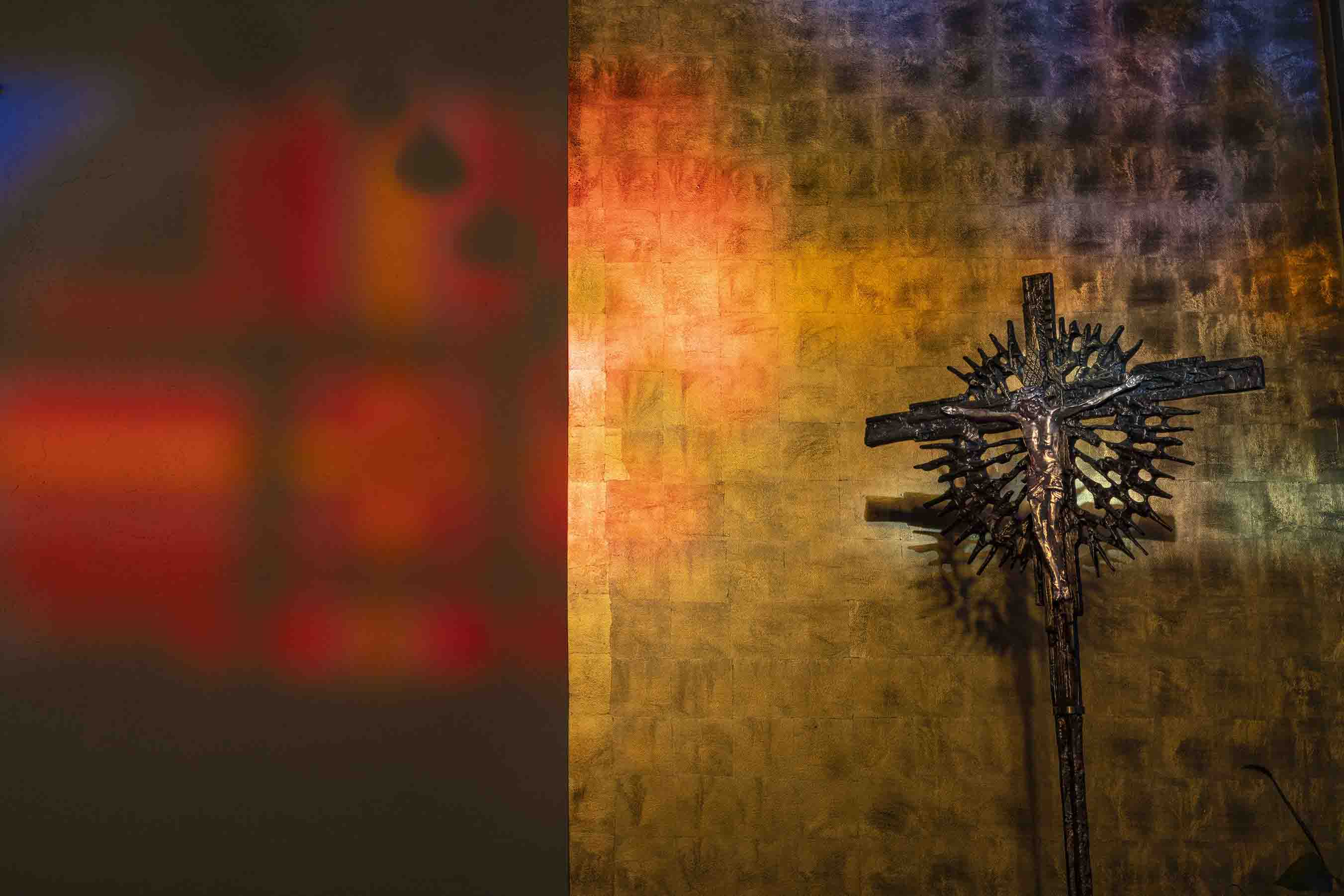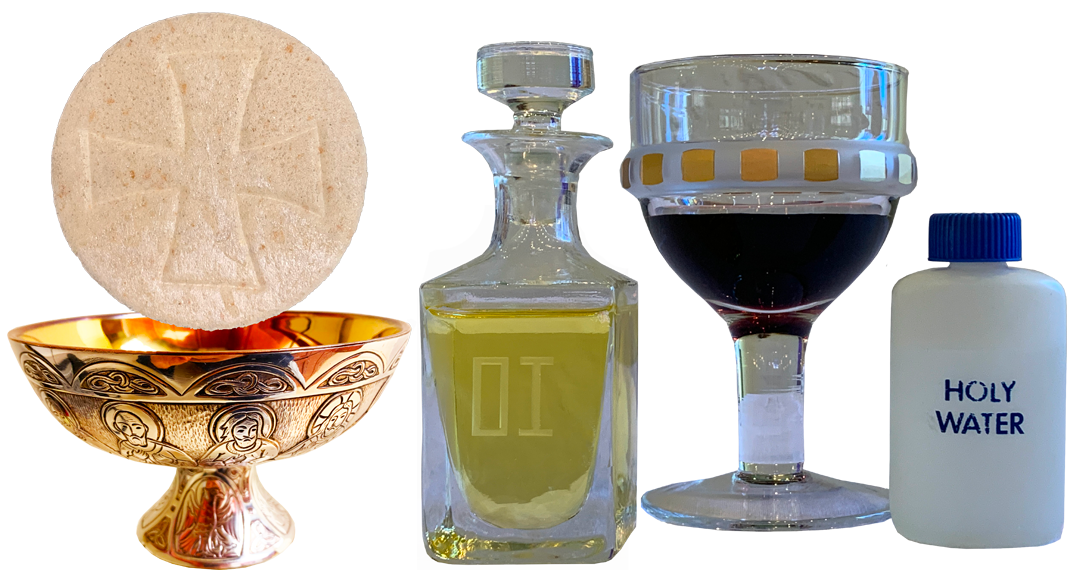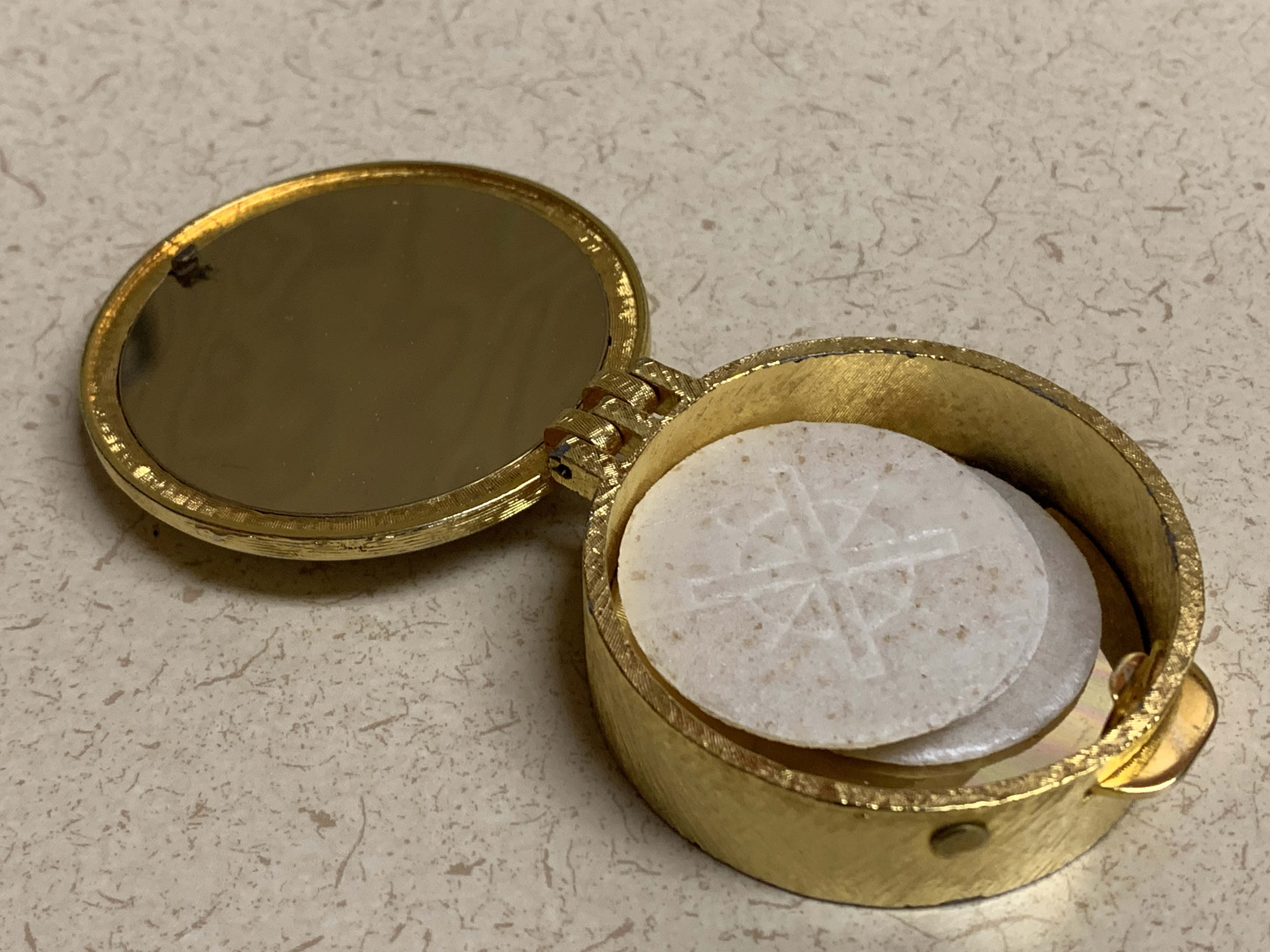
The Sacrament of the Anointing of the Sick
Commending those who are ill to the suffering and glorified Lord, that he may raise them up and save them.
The Sacrament of the Anointing of the Sick is held about 3 times throughout the year and if the pastor receives a request.
If you would like to receive the Sacrament, you can schedule an appointment with the pastor at 503 771-6039.
Explanation of the Sacrament of the Anointing of the Sick
Below is a simple outline that can navigate you to one of the five sections.
All of us experience some measure of sickness, pain, and suffering in this life. It is part of the human condition. It can be a stumbling block for many people in their relationship with God. Some become bitter. So why does God allow suffering? It is a mystery. However, the Catechism asserts that he who lovingly wills the greatest good for us, also knows that he can bring good out of evil.
The sufferings and evil in this life can never be completely turned around. But Good can come from them. For example, one of the most evil human acts in which humanity tried to kill God, was used to save us. All throughout the Bible we see examples where suffering and difficulty is not a dead end, but an opportunity: An opportunity to experience God as never before and to get to know him at a deeper level. Abraham’s wife, Sarah’s barrenness was an opportunity to experience that nothing is impossible with God. The Israelites cornered in the Red Sea were given a taste of God’s power and help. When Joseph’s brothers sold him into slavery, it seemed his life was over. God turned that around and used that very act to save Joseph’s brothers and the rest of their family from famine. All of the healing stories in the New Testament were opportunities to experience not just healing, but God’s compassion, God‘s presence, and his love.
I think all of us can also acknowledge that suffering and struggle in our lives has also made us better people. Suffering, eliminates our shallowness, takes us deeper, helps us identify with the pain of others and be more compassionate. Why does God allow terrible evils? Much of it is a mystery. But, if we cooperate with God, he can bring good from it. We also know that God became man to share in our human condition and walk with us in our pain suffering. He freely accepted that out of his love for us.
In the entry on the anointing of the sick, the catechism acknowledges these themes, and says the following:
CCC 1501: “Illness can lead to anguish, self-absorption, sometimes even despair and revolt against God. It can also make a person more mature, helping him discern in his life what is not essential so that he can turn toward that which is. Very often illness provokes a search for God and a return to him.”
Background and Origin of the Sacrament
- The origins of this Sacrament go back to Jesus Christ Himself, who showed a “preferential love” for the sick and those who suffer. The Gospels recount that on many occasions, he healed all the sick who came to him. He went so far as to even identify with them, saying, “I was sick and you visited me”
 (Mt 25:36 & CCC 1503).
(Mt 25:36 & CCC 1503). - Ultimately, Jesus accepted suffering and death for our sakes that we might be healed of a worse sickness, sin and ultimately saved from death.
- In Jesus’ ministry, he used physical signs to heal. Today, in the Sacraments, we believe Christ continues to “touch us” in order to heal us” (cf CCC 1504).
- Jesus invited his disciples to take up their crosses and also to share in his ministry of compassion and healing. In the early Church, the Acts of the Apostles has stories that show St. Peter and Paul and the other early Christians laying hands on the sick, using Jesus’ name and people were healed (cf Acts 9:34; 14:3).
- The Church has taken Jesus’ charge to “heal the sick” (Mat 10:8) very seriously and throughout the centuries has sought to care for the sick and suffering through prayer, the development of hospitals, shelters, Orphanages, etc. The Church believes that in its work is manifested the “life-giving presence of Christ, the physician of souls and bodies” (CCC 1509).
- The origins of this Sacrament go back to Jesus Christ Himself, who showed a “preferential love” for the sick and those who suffer. The Gospels recount that on many occasions, he healed all the sick who came to him. He went so far as to even identify with them, saying, “I was sick and you visited me”
Who Receives and Who Administers this Sacrament?
-
- It is not a Sacrament only for those who are dying.
- The Sacrament is intended for the benefit of those who are seriously ill or elderly, and whose health is seriously impaired and those at the point of death.

- The Church encourages the Sacrament to be received at the beginning of a serious illness, not just at the point of death.
- It’s not for those with a common cold but for more serious matters.
- It can be received as often as it is needed.
- One can call a priest to schedule the Sacrament at any time.
- In addition, some parishes will have set times throughout the year when the Anointing of the Sick is given at the end of Mass.
- Only priests (bishops and presbyters) can administer the Anointing of the Sick.
How is this Sacrament Celebrated?
- This Sacrament can be received in the home, a hospital or a church, for one sick person or a group. (Matthew 9:12-13).
- It is most appropriate to celebrate it with the Eucharist which is a memorial of Jesus’ suffering and
 conquering of suffering and death.
conquering of suffering and death.
- If possible, it can be preceded by the Sacrament of Reconciliation and followed by the Eucharist. The Eucharist (called Viaticum), as the Sacrament of Jesus’ passing from this life, through death to eternal life, should be the last Sacrament received by a person before they pass over to eternal life (cf CCC 1517).
- How is the Sacrament Celebrated?: The Roman Rite says: “The sacrament of Anointing of the Sick is given to those who are seriously ill:
- By anointing them on the forehead and hands with duly blessed oil – pressed from olives or from other plants
- Saying, only once: “Through this holy anointing may the Lord in his love and mercy help you with the grace of the Holy Spirit. May the Lord who frees you from sin save you and raise you up” (CCC 1513).
The Effects of the Sacrament
The Catechism spells it out in the following way:
- A particular gift of the Holy Spirit:
- Grace to endure suffering: The person is given strength, peace, and courage to endure the sufferings of illness or old age. “This grace is a gift of the Holy Spirit, who renews trust and faith in God and strengthens against the temptations of the evil one, the temptation to discouragement and anguish in the face of death” (CCC 1520).
- Healing of the Soul: The grace of this sacrament is meant to result in the healing of the soul, the forgiveness of sins–if the person was not able to obtain it through the Sacrament of Reconciliation.
- Healing of the Body: The hope is that God will heal the person physically–if it is conducive to the salvation of the person’s soul.
- Union with the Passion of Christ: The sick person receives the strength and the gift to unite themselves to Christ’s passion, for their own good and that of the whole Church. This transforms their suffering and gives it new meaning: “it becomes a participation in the saving work of Jesus” (CCC 1521).
- A Grace for/from the Church: In the Sacrament, the sick person benefits from the prayer of the Church and Communion of Saints. The person benefits others in the Church and outside the Church by praying that their sufferings will help to sanctify others who need their prayers.
- Preparation for the Final Journey: The Sacrament gives the dying the grace and strength to endure the final struggles before death.
Viaticum
- Viaticum is a Latin word meaning, “food for the journey.”
- Viaticum is the Eucharist that is given to those who are nearing death.
- When the Eucharist is received at the point of death it takes on a unique significance. “It is the seed of eternal life and the power of resurrection, according to the words of the Lord: ‘He who eats my flesh and drinks my blood has eternal life, and I will raise him up at the last day’ (John 6:54). The sacrament of Christ once dead and now risen, the Eucharist is here the sacrament of passing over from death to life, from this world to the Father” (CCC 1524 and John 13:1).

